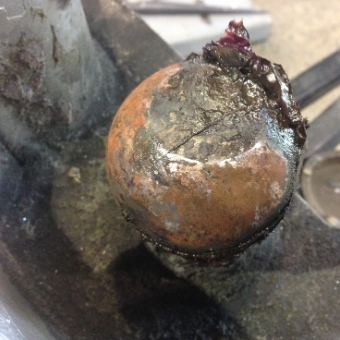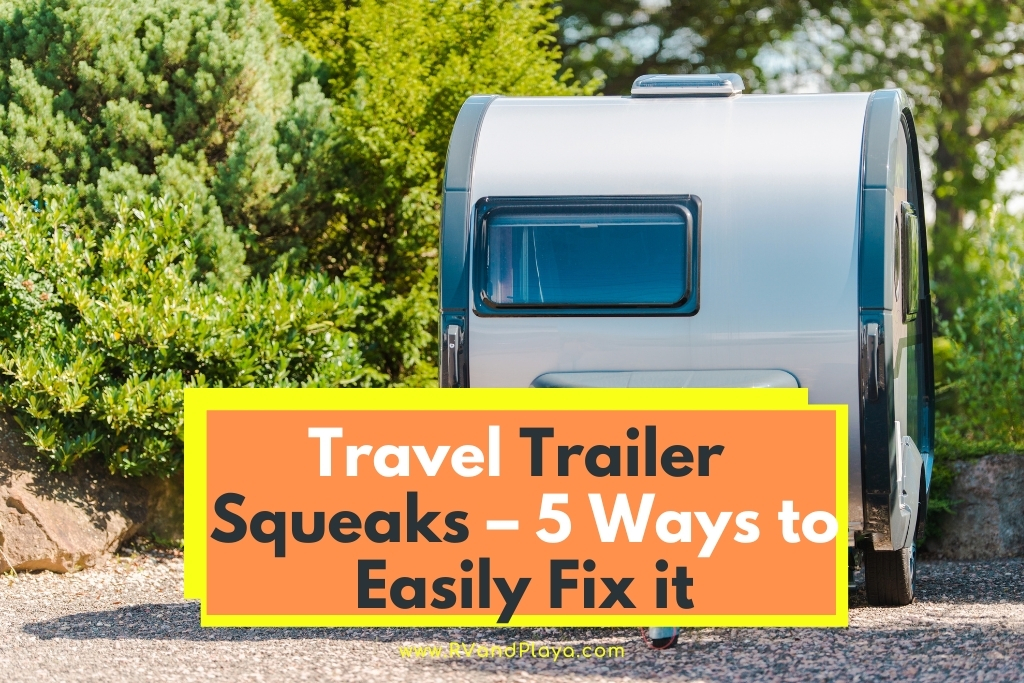Imagine that you’ve already packed your travel trailer, and you get down the highway in the early morning when you hear a horrible high-pitched noise that sounds as if it’s coming from your camper.
You perform a quick check, tie-down loose objects, and make sure all plugs are secure, but the squeaking continues.
Why does my travel trailer squeak? Here are some typical reasons that a travel trailer will start to squeak:
| Common Causes of Squeaking | How to Fix Them |
|---|---|
| The metal on the tow vehicle’s hitch ball starts to wear away | Use a lithium or petroleum lubricant |
| Rust between leaf springs | Replace worn or rusted suspension |
| Brakes | Purchase and replace brake pads |
| Wheel Bearings | Remove wheel bearings and pack with specified grease |
| Tight sway bar | Loosen sway bar |
Not only is this awful squeaking sound waking up everyone in a 20-mile radius, but your relaxing drive has now gone down the drain as your children cover their ears and squeal along with the noise coming from your trailer.
However, there are easy solutions that can keep you from deviating too far from your path that you can find below.
Table of Contents
Common Reasons Your Travel Trailer Squeaks & 5 Ways to Easily Fix it
Travel trailers, both new and old, are known to make various sounds. The more you use your trailer, the higher the chances are that you’ll become familiar with the different sounds that your trailer makes.
As for squeaking, here’s a list of typical causes:
- Worn down hitch ball
- Rusty suspension system
- Old and used brakes
- Excessive wear on wheel bearings
- Taut sway bar
1. Worn Down Hitch Ball
What and Where it’s Located: Usually a two-inch steel ball (either chrome- or nickel-plated) that you can find bolted on the hitch ball mount.
The ball’s primary use is to allow your trailer to maneuver efficiently while you travel by giving the trailer room to turn when necessary.
You can find different sizes depending on the size of the trailer you’ll be carrying.

Problem: The most common problem that hitch balls suffer is wearing out, which is caused by regular wear and tear from using the hitch.
Turns, bumps, and stops cause your hitch ball to begin to rust and lose its protective coating (the nickel or chrome finish).
Solution: The most common method of taking care of this metal-on-metal squeak is to apply some lithium grease or petroleum lubricant to the ball.
The goal is to provide a barrier between the layers of metal. Grease and oil are also water-resistant, reduce wear on your hitch ball, and fight corrosion.
Related reading: How Much Does It Cost to Install a Trailer Hitch? (with 9 examples)
2. Rusty Suspension System
What and Where it’s Located: In most cases, travel trailers have a leaf-spring or torsion-axle suspension system.
Most trailers and fifth-wheel suspensions use the leaf-spring suspension due to the affordability and easy setup.
Torsion-axle suspension systems use a steel axle tube, an inner steel bar, a trailing arm, and three to four rubber ‘bars’ inside the axle tube.
With the combination of the various components, the trailer weight applies pressure to the trailing arm, which moves up, causing the inner bar to ‘pinch’ the rubber bars.
These actions provide the trailer’s suspension system the proper support and motion.
Overall, the suspension system consists of the tires, air pressure, springs, and other shock-absorbing pieces.
Problem: Rusty leaf-springs beside dry pivots in the shackles, bushings, and spring ends can cause a squeak to occur.
Rust build-up happens over time or when condensation and water get into your suspension system. Water will start to corrode the metal, causing it to break down and rust.
Solution: If you think that your suspension system is the cause of the squeaking, a quick check you can do is have someone jump inside the trailer as you listen from the outside.
While outside, you can locate the sound and better pinpoint where your trailer is squeaking.
Depending on your mechanical ability, you may find the parts and replace them yourself (once you’ve found what was squeaking).
If you don’t feel comfortable replacing the pieces yourself, take it to a mechanic and let them know what you hear and where.
Easy Ways to Fix Trailer Squeak >> Check out the video below:
3. Old and Used Brakes
What and Where it’s Located: Modern trailers use electric brakes, which are activated by the connection between the towing vehicle and trailer.
The brakes are used to slow down and stop your trailer as you’re driving. Your electric brake system will include:
- A magnet
- A shaft
- An actuating arm
- A small front shoe
- A reactor spring
- A larger rear shoe
You can find the brake pads in the “shoes,” which will be in the wheel and hub assembly. The brake pads help the shoes resist heat from the friction made by the interaction between the magnet and the drum face.
Problem: Several ways that brake pads begin to wear down include:
- Hard and fast stops
- Heavy loads
- Uneven brake pressure
No matter what you do (unless you’re not driving), your brake pads will eventually wear down. Some situations, including heavier loads and hard braking, can cause your brake pads to break down sooner.
Solution: If your brake pads are worn out, it’s crucial to replace the brake pads with new ones.
Typically brake pads will be pretty affordable unless you invest in carbon ceramics and specialty types that can sometimes last longer, provide better braking pressures, and withstand higher braking temperatures without failure.
A mechanic can replace your brake pads, or you can do it yourself with the appropriate skills and tools.
4. Excessive Wear on Wheel Bearings
What and Where it’s Located: You can find the wheel bearings inside the hub, where each wheel and tire are mounted. These bearings are what allow the hub and wheel assembly to rotate, ultimately letting the trailer move.
There aren’t multiple parts that you would purchase for the bearings because they will be included in bearing kits.
Problem: Wheel bearings will start to squeak if they are not adequately lubricated, and there is excessive wear and tear on the bearings.
You can cause excessive wear whenever the metal begins to grind away because the bearings start to rust due to foreign contaminant build-up, including dirt and water.
Solution: There are two solutions for noisy wheel bearings. The first solution would be removing the wheel bearing and repacking it with “new” grease.
If you find that the excessive wear has already taken place, you’ll need to change out the wheel bearings.
Note: It’s always best to replace all wheel bearings at once instead of one at a time so that you can reduce the chances of uneven wear.
5. Taut Sway Bar
What and Where it’s Located: Your sway bar will typically be attached to the hitch mount and tongue of the trailer frame.
The bar helps stabilize your trailer during travel by reducing the chances of uncontrollable swaying that can lead to rolling over and other types of accidents.
Problem: If your sway bar is creating too much noise, it could be because the tension on the trailer sway bar is too tight and improper lubrication of the bar’s mounting points.
Solution: The best way to ease up tension on the bar is to adjust the mounting point on the trailer’s side. If it’s still squeaking, you can add some lithium grease to the mounting points.
Conclusion
While not every sound your trailer makes leads to a severe problem, it’s always important to check and maintain regular maintenance on your travel trailer.
By performing routine check-ups, you’ll be better prepared in case something does need to be fixed.
Once you’ve located the squeaking source on your travel trailer, many of the issues can be solved with intermediate mechanical knowledge or by taking your trailer to a certified mechanic.
By maintaining your trailer, you can take one worry off your vacation list.
Recommended Reading
For more helpful articles about travel trailers please check out our articles below:
LT vs. ST Tires for Travel Trailers: What Works Better?
Does Your Auto Insurance Cover a Travel Trailer? [Updated Rules]
How to Easily Determine the Correct Wheel Covers for RV Tires (17 Examples)
How to Compare Travel Trailers: A Comprehensive Step-by-Step Guide
Travel Trailer vs. Toy Hauler: 17 Differences That Matter
Travel Trailer vs. Camping Trailer: What’s the Difference?
How to Choose the Perfect Cover for Your Travel Trailer [Read This First]
Recent Posts
Is Toyota Remote Connect Free? (Subscription, Services Plans)
Does Toyota Remote Connect have an included trial? It used to be the case that, when you bought a new car, you made one straightforward payment and that was it. Now, it feels like there are...
Toyota Safety Connect: What It Is And Why You Need It? Whether you’re buying a new Toyota or you’ve had one for a while you will have been given the hard sell on their Connected Services but do...

